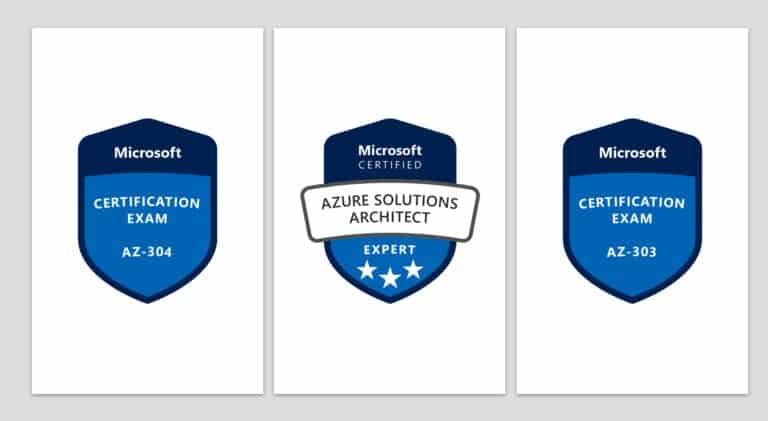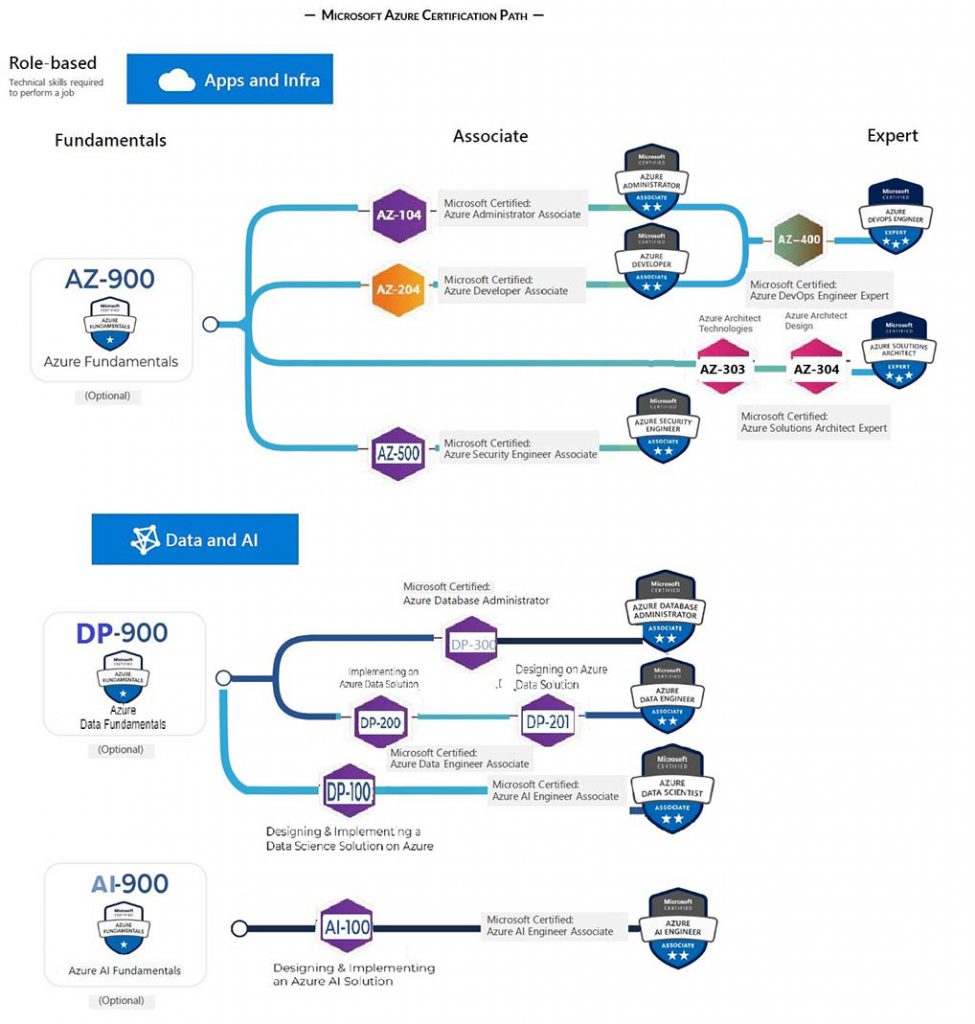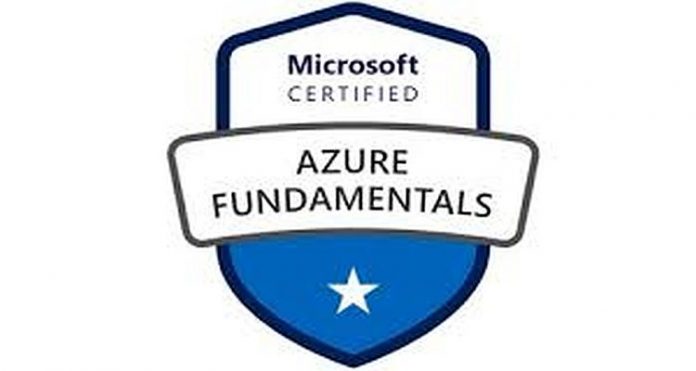Understanding the Role of a Microsoft Certified Azure Architect
A Microsoft Certified Azure Architect plays a pivotal role in designing, implementing, and managing robust cloud-based solutions using the Azure platform. These professionals demonstrate a deep understanding of cloud computing, Azure services, and best practices for solution design. They are responsible for bridging the gap between business needs and technical requirements, ensuring seamless integration of Azure services and optimal performance. As a Microsoft Certified Azure Architect, you will be expected to have a solid grasp of Azure services, security, governance, networking, and data management. Additionally, you will need to stay current with the latest Azure updates, new services, and best practices. This role requires strong problem-solving skills, attention to detail, and the ability to work collaboratively with cross-functional teams.
Microsoft Certified Azure Architects are highly sought after in various industries, and this certification can open doors to numerous career opportunities and advancement. By becoming a proficient Microsoft Certified Azure Architect, you will be well-positioned to lead successful cloud initiatives and contribute to the digital transformation of organizations.
The Path to Certification: An Overview of Microsoft’s Azure Architect Certification
The Microsoft Azure Architect certification is a valuable credential for professionals seeking to demonstrate their expertise in designing and implementing cloud-based solutions using Azure. The certification process involves passing one or more exams, depending on the specific role-based path chosen: Azure Solutions Architect Expert or Azure DevOps Engineer Expert. For the Azure Solutions Architect Expert path, candidates must pass two exams: AZ-303: Microsoft Azure Architect Technologies and AZ-304: Microsoft Azure Architect Design. These exams focus on the technical skills required to design and implement solutions that run on Azure, including infrastructure, security, and applications.
Prerequisites for the Azure Solutions Architect Expert path include a strong understanding of cloud concepts, Azure services, and at least one year of hands-on experience designing and implementing Azure solutions. Microsoft recommends candidates have experience with Azure development, Azure administration, or DevOps practices.
Numerous learning resources are available to help aspiring Azure Architects prepare for the certification exams, such as online courses, instructor-led training, and self-paced labs. Microsoft Learn, the Azure Solutions Architect Expert learning path, and the Azure DevOps Engineer Expert learning path provide structured learning paths with interactive content and hands-on labs.
By becoming a Microsoft Certified Azure Architect, professionals can showcase their skills and expertise in Azure architecture, opening up new career opportunities and demonstrating their commitment to staying current with the latest Azure technologies and best practices.
Exam Preparation: Key Skills and Knowledge Areas for Aspiring Azure Architects
To excel in the Microsoft Azure Architect certification exams, it is crucial to have a solid understanding of various skills and knowledge areas. Here are some essential topics that Azure Architects should focus on:
Azure Services
A comprehensive understanding of Azure services is crucial for Azure Architects. This includes compute services (such as Virtual Machines, App Services, and Azure Functions), storage services (like Blob Storage, File Storage, and Azure Data Lake Storage), and networking services (such as Virtual Network, Load Balancer, and Application Gateway).
Security
Security is a critical aspect of Azure architecture. Azure Architects should be familiar with Azure security services (such as Azure Security Center, Azure Active Directory, and Azure Key Vault) and best practices for securing Azure resources.
Governance
Governance in Azure involves managing and governing resources, policies, and compliance. Azure Architects should be familiar with Azure Policy, Azure Resource Manager (ARM) templates, and Azure Blueprints for implementing governance strategies.
Networking
Networking is a fundamental aspect of Azure architecture. Azure Architects should have a solid understanding of Azure networking services, virtual networks, subnets, network security groups, and Azure ExpressRoute.
Data and Analytics
Azure Architects should be familiar with Azure data services, including Azure SQL Database, Azure Cosmos DB, Azure Synapse Analytics, and Azure Data Factory, to design and implement effective data solutions in Azure.
Hybrid Integration
Many organizations have hybrid environments, combining on-premises and cloud resources. Azure Architects should be knowledgeable about hybrid integration solutions, such as Azure Stack, Azure Arc, and Azure ExpressRoute.
Monitoring and Management
Monitoring and managing Azure resources is essential for ensuring optimal performance and addressing issues promptly. Azure Architects should be familiar with Azure Monitor, Azure Log Analytics, and Azure Application Insights for monitoring and managing Azure resources.
By focusing on these key skills and knowledge areas, aspiring Azure Architects can better prepare for the certification exams and succeed in their careers.
How to Excel in the Microsoft Azure Architect Certification Exams
Passing the Microsoft Azure Architect certification exams requires a strategic approach and effective study techniques. Here are some tips and strategies for excelling in the certification exams:
Understand the Exam Format
Familiarize yourself with the exam format, including the number of questions, types of questions (multiple choice, drag-and-drop, etc.), and the time allotted. This information can help you develop a study plan and time management strategy.
Leverage Learning Resources
Microsoft provides various learning resources, such as online courses, instructor-led training, and self-paced labs, to help you prepare for the certification exams. Utilize these resources to gain hands-on experience and deepen your understanding of Azure architecture.
Create a Study Plan
Develop a study plan that covers all the essential skills and knowledge areas required for the exams. Allocate sufficient time to study each topic and track your progress to ensure you stay on schedule.
Practice with Practice Exams
Practice exams are an excellent way to assess your readiness for the certification exams. They can help you identify areas where you need improvement and provide valuable insights into the exam format and question types.
Join Study Groups
Connect with other aspiring Azure Architects through forums, events, and online platforms. Study groups can provide support, motivation, and opportunities to learn from others’ experiences and insights.
Review Exam Objectives
Thoroughly review the exam objectives and ensure you understand each topic. Focus on areas where you are less confident and allocate more time to studying those topics.
Time Management
During the exam, manage your time effectively. Read each question carefully, eliminate incorrect answers, and make informed decisions. If you are unsure about a question, flag it for review and move on to the next one.
By following these tips and strategies, you can increase your chances of success in the Microsoft Azure Architect certification exams and become a proficient Microsoft Certified Azure Architect.
Real-World Experience: The Importance of Hands-On Practice in Azure Architecture
Gaining hands-on experience is crucial for mastering Azure architecture and becoming a proficient Microsoft Certified Azure Architect. Practical exercises, lab environments, and project-based learning provide invaluable opportunities to apply your knowledge and skills in real-world scenarios.
Practical Exercises
Perform practical exercises to reinforce your understanding of Azure services and features. For example, create and configure virtual machines, storage accounts, and virtual networks. Experiment with Azure functions, Logic Apps, and Power Automate to automate business processes. These exercises will help you become more comfortable with the Azure platform and its capabilities.
Lab Environments
Lab environments offer a safe and controlled space to practice Azure architecture skills. Microsoft Learn provides interactive labs that guide you through various Azure scenarios, allowing you to gain hands-on experience with minimal setup. Additionally, you can create your own lab environments using Azure DevTest Labs or third-party lab solutions.
Project-Based Learning
Project-based learning is an effective way to deepen your understanding of Azure architecture. Participate in hackathons, workshops, or build your projects using Azure. Collaborate with other professionals, or seek mentorship from experienced Azure Architects. These projects will help you develop problem-solving skills, learn best practices, and showcase your expertise to potential employers.
Benefits of Hands-On Experience
Hands-on experience offers numerous benefits, including:
- Enhanced understanding of Azure services and features
- Improved problem-solving and critical thinking skills
- Increased confidence in working with Azure architecture
- Demonstrable experience for potential employers
By incorporating hands-on experience into your learning journey, you will become a more proficient Microsoft Certified Azure Architect and better prepared to tackle real-world Azure challenges.
Staying Updated: Keeping Your Azure Architect Skills Current and Relevant
As a Microsoft Certified Azure Architect, staying current with Azure updates, new services, and best practices is crucial for long-term success. Here are some strategies to help you stay up-to-date and maintain your expertise:
Follow Azure Blogs and Newsletters
Subscribe to Azure blogs, newsletters, and social media channels to receive the latest news and announcements. The Azure Blog and the Azure Updates page are excellent resources for staying informed about new features, services, and updates.
Participate in Azure Community Events
Engage with the Azure community by attending webinars, meetups, and conferences. These events provide opportunities to learn from experts, network with peers, and discover new trends and best practices in Azure architecture.
Leverage Azure Documentation
Azure documentation is a valuable resource for learning about new services, features, and best practices. Regularly review the documentation to ensure you have the most current information and guidance.
Join Azure User Groups and Forums
Participate in Azure user groups and forums to connect with other professionals, ask questions, and share insights. These communities can help you stay informed about the latest Azure developments and provide support as you navigate your Azure architecture career.
Explore Azure Certifications and Learning Paths
Microsoft offers various role-based certifications and learning paths that cover new Azure services and best practices. Regularly review these resources to identify opportunities for expanding your skillset and staying current with the latest Azure technologies.
Practice Continuous Learning
Embrace a mindset of continuous learning and commit to regularly investing time in learning new Azure skills and concepts. By dedicating even a small amount of time each week to learning, you can significantly enhance your Azure expertise and ensure you remain relevant in the ever-evolving cloud landscape.
By following these strategies, you can stay updated on Azure updates, new services, and best practices, ensuring your skills as a Microsoft Certified Azure Architect remain current and relevant in the rapidly changing technology landscape.
Career Opportunities and Advancement for Microsoft Certified Azure Architects
Earning a Microsoft Certified Azure Architect certification can open up a wide range of career opportunities and paths for growth within the Azure architecture field. Here are some key job roles, salary expectations, and industry trends to consider:
Job Roles
As a Microsoft Certified Azure Architect, you can pursue various job roles, such as:
- Cloud Solutions Architect
- Cloud Architect
- Azure DevOps Engineer
- Azure Infrastructure Architect
- Azure Security Engineer
Salary Expectations
Salaries for Microsoft Certified Azure Architects can vary depending on factors such as location, experience, and job role. According to the Payscale and Indeed websites, the average salary for a Cloud Architect in the United States ranges from $98,000 to $145,000 per year.
Industry Trends
The demand for Microsoft Certified Azure Architects is growing as more organizations adopt cloud computing and migrate to Azure. According to the Global Cloud Computing Market report, the global cloud computing market is expected to reach USD 832.1 billion by 2027, with a CAGR of 14.9% during the forecast period. This growth presents numerous opportunities for Microsoft Certified Azure Architects to excel in their careers.
Continuous Learning and Advancement
To advance in your career as a Microsoft Certified Azure Architect, consider pursuing additional certifications, such as the Microsoft Certified: Azure DevOps Engineer Expert or the Microsoft Certified: Security, Compliance, and Identity Solutions Expert. Regularly update your skills and knowledge by attending workshops, webinars, and conferences, and engaging with the Azure community through forums, events, and online platforms.
By staying up-to-date with the latest Azure technologies, best practices, and trends, you can position yourself as a valuable asset in the Azure architecture field and capitalize on the growing demand for Microsoft Certified Azure Architects.
Networking and Community: Connecting with Other Azure Professionals
Networking and engaging with the Azure community can significantly enhance your career as a Microsoft Certified Azure Architect. Connecting with other professionals allows you to learn from their experiences, share insights, and stay updated on the latest Azure trends and best practices. Here are some ways to build your professional network and engage with the Azure community:
Participate in Online Forums and Communities
Join online forums and communities, such as the Microsoft Tech Community and the Azure subreddit, to connect with other Azure professionals, ask questions, and share knowledge. Active participation in these forums can help you establish yourself as an expert and build relationships with other Azure enthusiasts.
Attend Azure Conferences and Events
Participate in Azure conferences and events, such as Microsoft Ignite, Build, and Inspire, to learn from industry experts, network with peers, and discover new Azure solutions and best practices. These events provide excellent opportunities to expand your knowledge, showcase your expertise, and build your professional network.
Join Azure User Groups
Join local or online Azure user groups to connect with other Azure professionals in your area or around the world. User groups often host meetings, webinars, and workshops, where you can learn from experts, share your experiences, and engage in discussions about Azure architecture, services, and best practices.
Engage on Social Media
Follow Azure influencers, experts, and thought leaders on social media platforms like Twitter, LinkedIn, and GitHub. Engage in conversations, share content, and participate in discussions to expand your network and stay updated on the latest Azure news and trends.
Collaborate on Projects
Collaborate with other Azure professionals on projects, hackathons, or open-source initiatives to learn from their experiences, share your expertise, and build your professional network. Collaborative projects can help you enhance your skills, gain new perspectives, and establish long-lasting relationships with other Azure enthusiasts.
By actively participating in the Azure community and building your professional network, you can enrich your career as a Microsoft Certified Azure Architect, stay updated on the latest Azure trends and best practices, and contribute to the growth and success of the Azure ecosystem.







